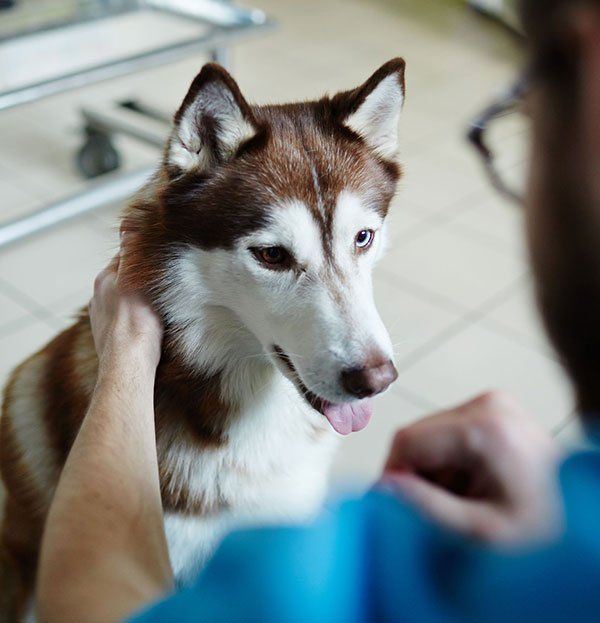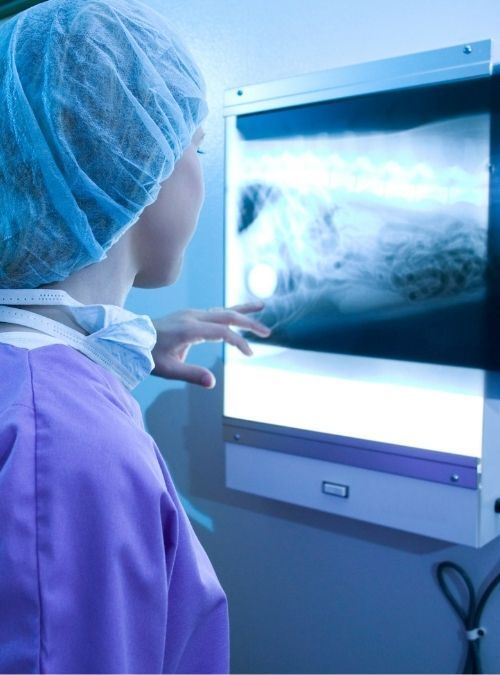Medical Services
Onsite Diagnostics
We hope that your pet is never in need of any extensive medical services, but rest assured, if they are in need we have state-of-the-art technology to meet those needs such as:
Digital X-Ray
In house radiology allows us to examine your pet's body in ways our naked eye can't. Radiographs are most often used to assess the internal organs and bones.
Complete In-House Laboratory
Having an in-house laboratory allows us to quickly and efficiently check for underlying health conditions in your pet. A small blood or urine sample can give us a wealth of information about internal organ function. The sooner an issue is detected, the easier, and more cost-effective the treatment will be.
Dental Pet Care
Dental care is a significant part of your pets overall health. Not only is dental disease painful, if it's left untreated toxins from the mouth can spread from the blood stream to the internal organs. This can cause issues with the heart, liver kidneys and more. Our team can help your pet with their bad breath through dental cleaning and ensure that their mouth is in tip-top shape by performing digital x-rays just like their owners when they have a dental cleaning.
Signs of dental care needs:
By assessing your pet's oral health regularly, you can help our team detect the early signs of dental disease. Here are some of the signs you need to watch out for:
- Teeth that are broken or have become loose
- Red and inflamed gums
- Additional teeth that should not be there, including baby teeth that have not fallen out naturally
- A build-up of plaque and tartar, or major discoloration on the teeth themselves
- Difficulty chewing, excessive drooling, or food dropping from your pet's mouth
- Signs of pain or discomfort in the mouth area, including when you gently touch the area around your pet's jaw
- Loss of appetite, or even a refusal to eat – keep an eye on your pet's usual diet and note any changes
- Bleeding in or around the mouth
- Swollen areas around the jaw or mouth area
If you notice any of these signs, get in touch with our team. Dental care needs tend to get worse quickly if they are left untreated. Our veterinarian will perform an oral examination and guide you towards the best treatment plan for your pet.
What We Recommend:
We know how much you love your pets, let us help you support and protect them as they grow. Did you know that oral care becomes even more crucial for pets as they age and that oral diseases are common in dogs over five years old? Did you also know that periodontal disease is preventable — but becomes difficult to get rid of once it takes hold? This is why dental care should be the top priority.
With this in mind, we recommend the following to keep your beloved pets happy and healthy:
- Dental examinations and checkups at least every year.
- Regular dental cleaning procedures to treat any potential problems.
Dental disease is preventable! With good oral hygiene and a proactive approach to treatment and assessment, we can help manage dental disease.
Dermatology
Does your pet have an itch they can't scratch? Our team can help diagnose any underlying skin conditions that may be affecting your pet and provide them with relief through medications and nutritional changes.
Pets can develop skin conditions caused by hormonal disorders, allergies, infections, and parasites such as fleas or mites. It is best to promptly address any lumps, bumps, inflammation, scaling, scabs, or bare patches with our veterinarian before they become difficult to treat.
Some skin issues are readily diagnosed based on presenting symptoms during an examination. Blood work, urinalysis, skin scraping, or biopsies may be needed to make a further diagnosis.
Your pet’s excessive scratching, licking, or chewing to one area of the body will alert you to a problem. You will want to find the source and start treatment early.
Together we will create a long-term management plan to decrease the frequency and severity of flare-ups.
Therapeutic Laser
What is therapeutic laser therapy?
The mechanism upon which its functionality is based revolves around the properties of light; more specifically, laser therapy makes it possible to concentrate and transfer a very high quantity of energy on a specific surface. The patient’s body transforms this bright energy into chemical energy through cellular mechanisms. This chemical energy is essential to carrying out daily biological functions, in this case in a shorter time span and with a very high efficacy.
This process translates into a reduction in healing time for the patient, who will see the benefits of laser therapy through a decrease in pain, inflammation, swelling, as well as in recovery time in general.
What is therapeutic laser used for?
- Treatment of sharp and chronic pain
- Sealing of surgical wounds
- Regeneration and sealing of wounds
- Healing of bone fractures after surgical operation
- Treatment of musculoskeletal pain, both sharp and chronic
Tonometry
Tonometry is a procedure that measures the pressure within the eye (called intraocular pressure). At our clinic, we are proud to have invested in a state-of-the-art tonometer, an advanced instrument used to diagnose Glaucoma in your dog or cat.
Glaucoma is a build-up of fluid causing abnormally high pressure, which can damage the retina and optic nerve, causing pain and leading to vision loss.
You may be familiar with the procedure in humans. Your optician uses an air jet test. In veterinary medicine, electronic and pneumatic versions of this test are more comfortable for your pet.
A local eye drop will numb the eyeball. Your veterinarian can examine the eye without alarming your pet.
The onset of Glaucoma can be sudden or occur over time, depending on the reason for fluid build-up. Regular health examinations will pick up any signs of Glaucoma. However onset can also be sudden.
If you have concerns about the condition of your pets eye, a visit to your vet is in order. Early treatment will manage pain and prevent loss of vision.
Radiology
Whether we are diagnosing problems or ruling out possible causes, x-rays are an extremely valuable diagnostic tool in the treatment process.
Sometimes we will find abnormalities on a physical examination where we need a closer look at what is beneath the skin. This is why we have both full body and dental X-ray machines within the clinic.
X-rays are often associated with diagnosing broken bones, however, there is so much more we can learn about your pet's condition from radiology.
X-rays help us assess the condition of your pet's:
- Digestive system, including the stomach, liver and intestines
- Heart and lungs
- A variety of other abdominal organs, including the kidneys, bladder and the prostate
- The oral cavity, especially the teeth and surrounding structures.
- Joints and bones
- The spine.
Radiographs can be captured quickly and painlessly, so you don't need to worry about stressing out your pet any further. In some cases, sedation or anaesthesia may be required, and our veterinarian will discuss this with you ahead of the procedure. Modern x-ray technology also produces far less radiation than older machines, so you can rest assured that the procedure is safe for your pet.
Once we have completed the x-ray, we'll get the images almost instantly so we can start examining your pet's results. In complex cases, we do also have the opportunity to send images to a radiologist for a specialist opinion.



